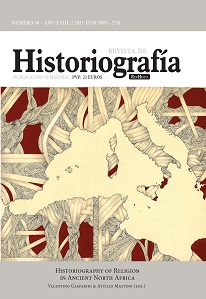Post-Colonial Rome, and Beyond
Religion, Power and Identity
DOI:
https://doi.org/10.20318/revhisto.2021.6561Keywords:
agency, creolization, deconstruction, discrepancy, hybridity, post-colonial, subalternAbstract
Roman archaeology is one of the major subfields of archaeology in which post-colonial theory has flourished, and not just in relation to the role of the past in the present, but also as a means to approach the interpretation of the Roman world itself. The region of North Africa was a major focal point for some of the earliest post-colonial studies on the Roman Empire, and has remained an arena of investigation for scholars influenced by the Anglophone debate on post-colonial theory, which emerged in the 1980s and flourished in the 1990s, often with a focus on Roman Britain. Religion is both a key source of evidence and an obviously important theme in understanding cultural change, interaction and power, and thus it has likewise been of interest to scholars from within and beyond the region. Here, I give an overview of the work of some of the influential Roman archaeologists working within the post-colonial tradition. I also consider the complex intersections of ancient and modern, and of Britain and North Africa, found in this body of work, and evaluate the impact this tradition of thought continues to have on Roman archaeology going forwards.
Downloads
Downloads
Published
Issue
Section
License
The holder of the copyright for the contents of this journal is the Instituto de Historiografía "Julio Caro Baroja" of the Universidad Carlos III de Madrid.
